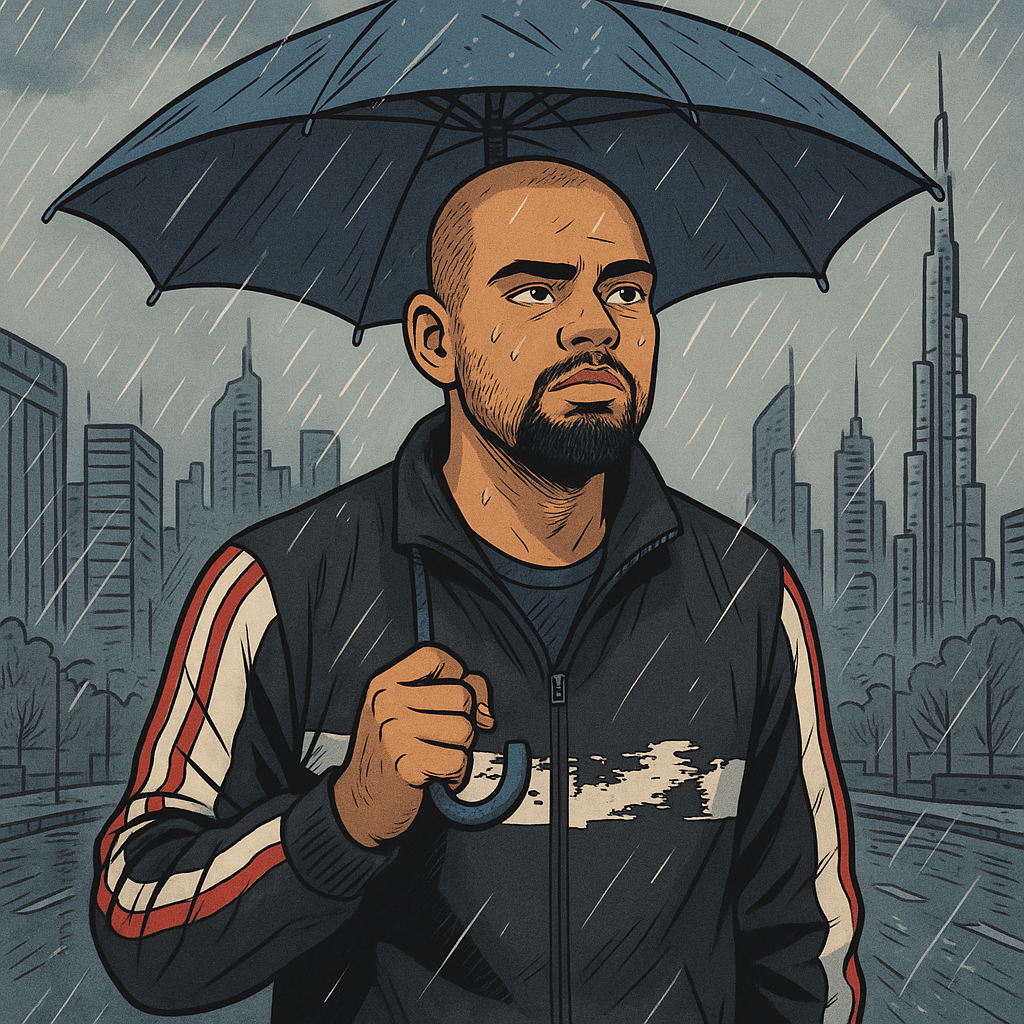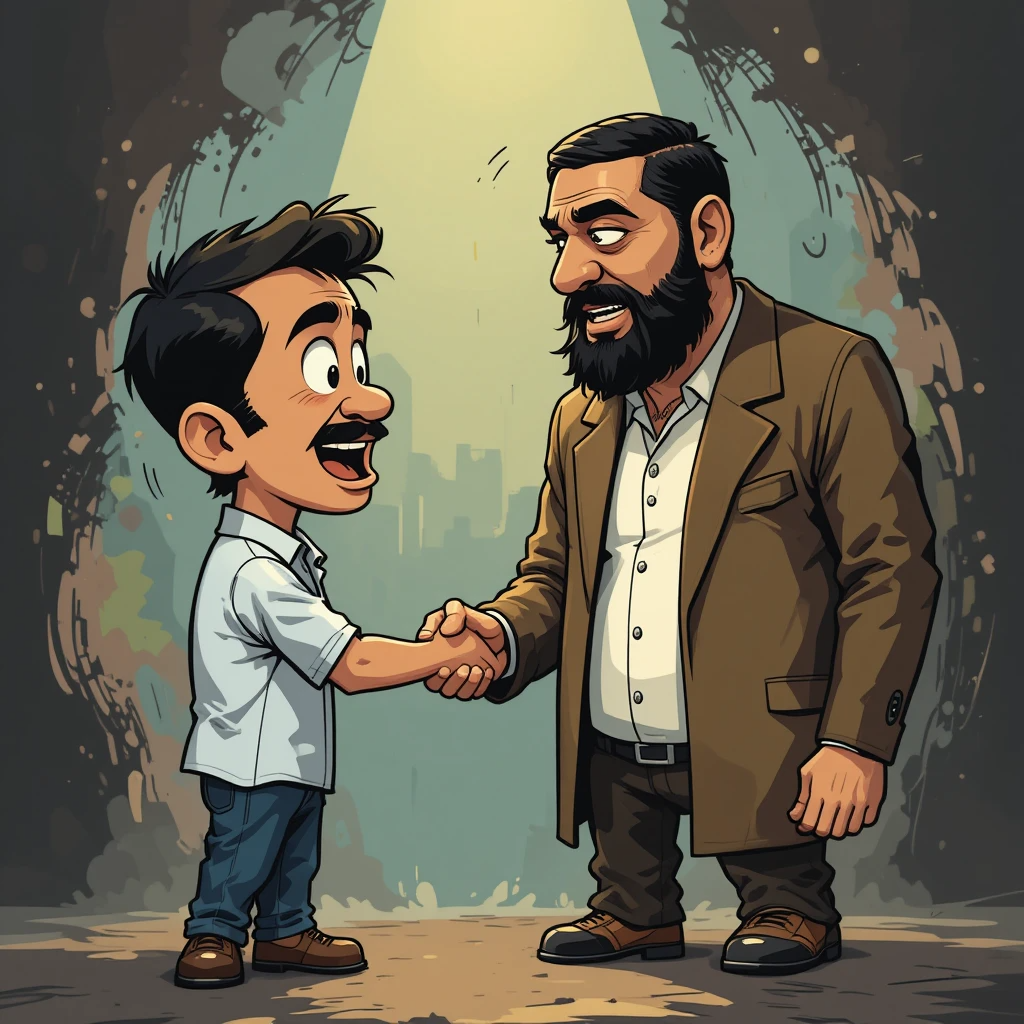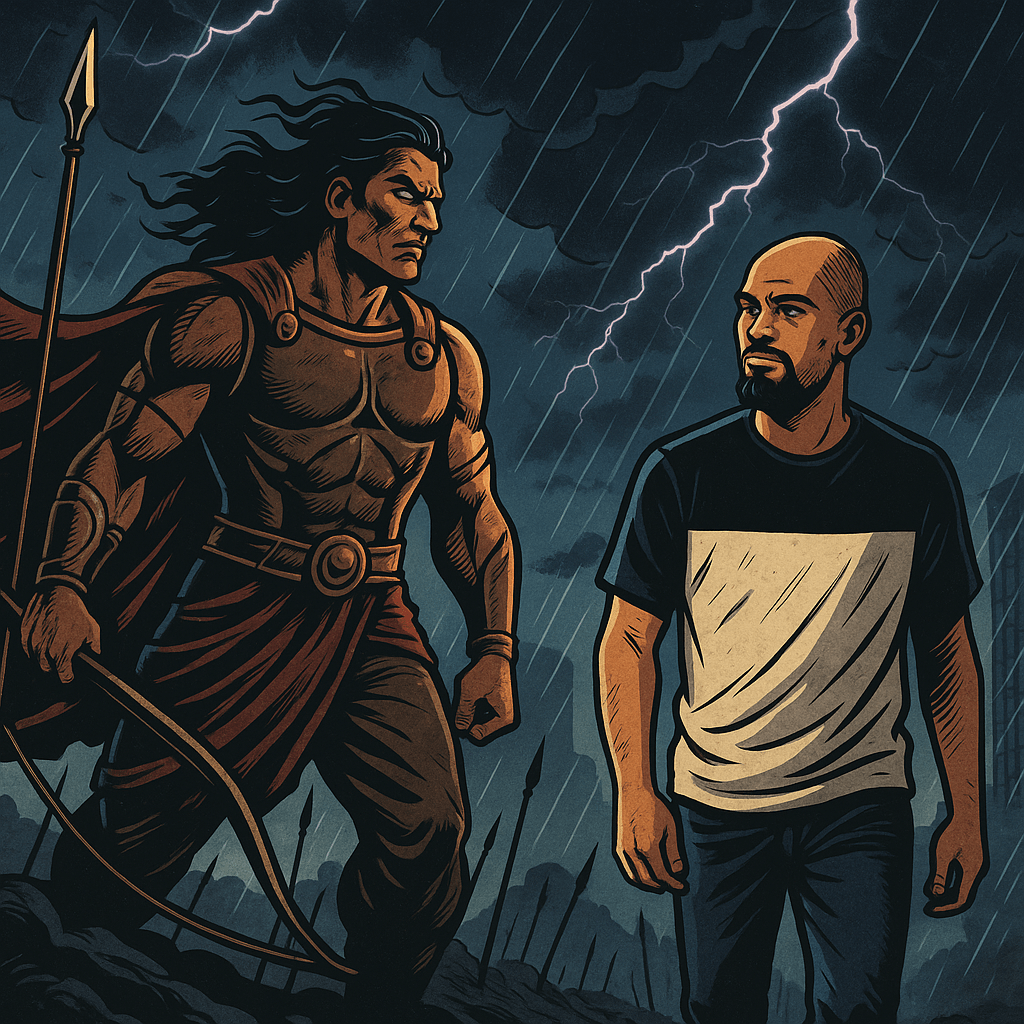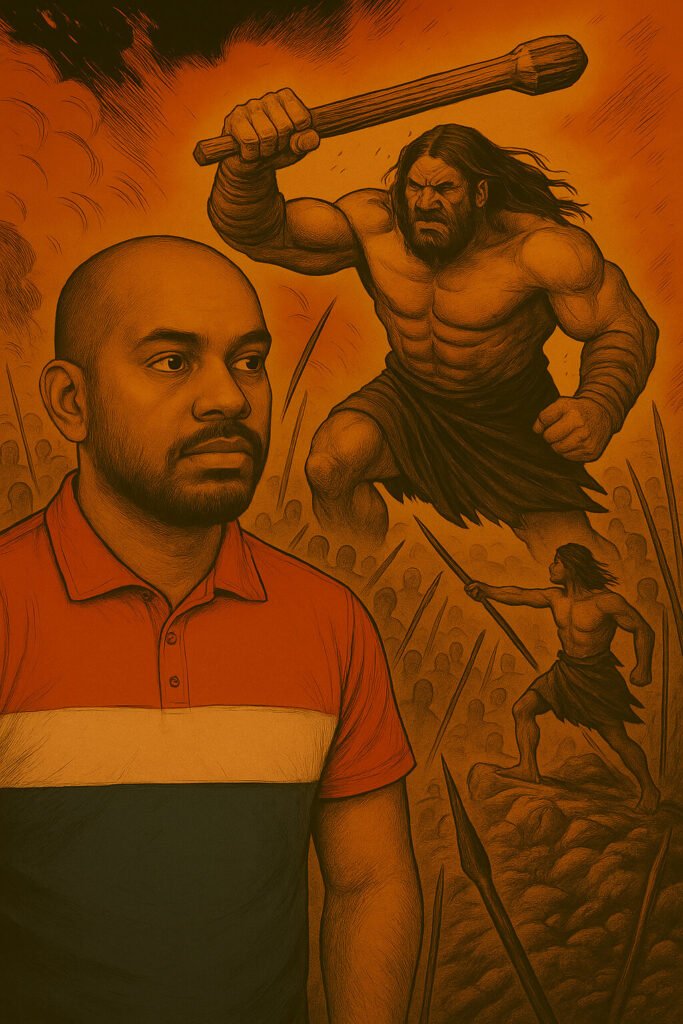Dubai was a world of extreme emotions and expressions to Einstein in the beginning months. If they got chances to grow, the people who were ready to cut the legs of others, the people who were always learning and fighting each other daily for growth, and the always available sex bodies—it was the Dubai around Einstein. It seemed like a jungle artificially developed on a desert.
The jungle grown on a desert; Dawood, Einstein, Khadolkhajan and the truths around people in Dubai
It was a rainy morning in Jebel Ali, Dubai. Einstein woke up from the bed and started his day as usual. There was no rain and the weather was sunny at that time when Einstein came out of his building. He saw the whole path wet, with a little flooding of water in some low places on the road. Einstein cursed the dirty water and assumed it was from the building’s toilet water collecting trucks, because he never thought of rain in Dubai. How could rain fall in a desert, even though you advertise the place like anything to the world through mobile phones and televisions? But his friends confirmed it. As he was sleeping at dawn, they had witnessed the magic. The rain in Dubai had happened.
He couldn’t even visualise that moment. So he waited for weeks until he saw the rain for the first time in Dubai, when he was inside a big building in Business Bay. It was raining outside—he saw the magic with his own eyes that day. And he realised that whenever the rare rain comes to Dubai, usually people around him start talking about a big rain that happened earlier. As he was new in Dubai, he was not aware of it. Years back, one day the rain suddenly came to Dubai. People said it was not natural, but artificially created by the authorities. But it sank the whole city. All of the work got jammed.

Because there was no drainage system in Dubai.
The sewage system in Dubai city still works by picking up wastewater in containers from building to building and dumping it somewhere that he doesn’t know. Like a stock market company structure, he was attending for a job.
Where Einstein’s colleagues called random people from their office phones and scammed money from expats. The company was run by a North Indian, with the help of many youngsters from India and Pakistan who were looking for jobs in Dubai. These youngsters repeated the same explanation about the US stock market to the receiver on the other end of the phone call. Many people cut the call when they started the usual greeting: “Good morning sir, myself Shilpa calling from the Financial Market. Is this the right time to talk to you? Because I have very important news for you, Sir or Madam.” But many let them talk and followed their instructions.
When the youngster persuaded and promised the client the nearest chance to make more money than their annual salary, just within a week—people believed! The expats, tired of many years of work in Dubai and not seeing any growth in life, wanted to get rich quickly and leave the Dubai loop as soon as possible. Because he or she was missing their loved ones, their care, the moments outside they believed existed by watching reels, and most importantly—their old personality. Because Dubai was illusional, and it made people illusional. So they jumped without ropes whenever they saw a chance to escape, even before confirming if it was real or fake.
The youngster from the other end would call them in the evening and persuade the client to put a lot of money into their wallet. The client—who was once gaslighted and insulted in front of everyone in the office last evening—took the stock market kid’s financial advice seriously, because self-respect and peace seemed valuable to them after long years of slavery in Dubai. They put a big share of their lifetime savings in Dubai into the “tikytoky.com wallets”—and visualised the money doubling the next day or next week, just as the youngster had told them. But puff… always the final news from the youngsters would be a stock market crash—“We are sorry, madam or sir. You lose all your money.”
Einstein doesn’t know where the money goes—like the drainage waters in the trucks of Dubai at midnight. So, he didn’t work for the stock markets, which are basically the big, big buildings, illusional jobs, to show off to your friends and family or home country people who always come to you and ask, “When did you come?” (while you return to your home country) and “When will you go?” (after one week of your return). But he understood—how easily money is running through hands in Dubai within a fraction of a second.

He visualised himself like Harshad Mehta.
A bad guy who is also intelligent. Who pumped the money from the money market of people and the government of India while everyone was chasing unclear goals in life.
One night, inside his dark room, Einstein was writing down his own unclear goals in life on the laptop. People don’t believe him when he says he has had this habit since childhood—writing in the darkness. In the old days, when he was a kid, he wrote things on paper with the lamp or candlelight. On the coast during summer, the ocean washed the land and frightened the fishermen. They half-slept every night, alerting themselves that the sea might come inside their house—so they could run out of it.
During those days, the local government arranged public lights in the streets temporarily. Two or three days, electricity would not be there for the entire night—so Einstein took his notebooks and sat under the streetlights and wrote things down. From those days, he wished for freedom over his life. And he found money to be the first thing needed to achieve it. When people chase money without purpose, Einstein dreamed of his freedom—to travel wherever he wanted, eat the foods he liked, and have the moments he desired in life.
Harshad Mehta scammed a government bank and the Indian stock market by understanding its system with his brain.
He made a hole inside the money market flow and diverted a big amount into his pocket.
The intelligence, presence of mind, and knowledge about the stock and money market were the things that made him work it out.
As Einstein had intelligence, presence of mind, and knowledge of the stock market—he couldn’t do what Harshad Mehta did.
He figured it out—it’s because he was far away from the stock market, physically or technically. The prominence of the place where you try to acquire something is very important when you start a war.
So he was disappointed and let his heart leave the Harshad Mehta effect.

Days passed, and Einstein went through new learnings in Dubai. One day, he reached a bookshore and saw a book unexpectedly, which had “Dubai” in the title.
Sometimes our ways change—but the heart wants what it wants.
“Dongri to Dubai”
And under the big title, a little caption: six decades of Mumbai Mafia.
Einstein saw an unknown person on the cover page of the book. But he liked the cover, with a Mumbai building on one half of the person’s face. So he assumed that guy must be someone brilliant like Harshad Mehta, and according to the book, he had a big connection with Dubai too.
Haji Mastan, Karim Lala, and Varadarajan Mudaliar—the three names Einstein read in the book that night. The trio who controlled the whole Mumbai underworld and outer world together in the 1970s. All three strengthened their monetary collections through the usual process done by all gangsters in history—simply transporting drugs, gold, or any other valuable product country by country, but cheating the government on taxes. Einstein saw it as a brain-oriented activity—making a huge idea they cultivated from their own past worker experiences and using it to cut tax. When the government didn’t do development properly with tax money—and as all of them had gone to Bambai (Mumbai) as hungry coolies in their teenage years or twenties—Einstein couldn’t judge the gangsters initially.
They all learned a lot about human psychology and the loopholes in systems made by British colonisers, capitalists, and the government to pump money.
Also, all these three gangsters seemed like socialists in their beginning stages to Einstein. They encouraged the vulnerable coolies in poverty to dream big and provided them with food and life. As they knew hunger and poverty from their own experiences, they became humble towards the downtrodden coolies. They gradually figured out the real problem they faced in life—the one that kept them as slaves—was a government formed with the systems of colonisers and capitalists, or both together.
By deeply thinking about solutions for independence and liberty, they became something new. And it was all without their fathers’ property.
And then came the next generation of this trio in Mumbai—a kid named Dawood.
A boy who studied well but stole things when he was hungry.

Dawood, Einstein, Mustafa and Khadolkhajan
Mustafa was from Pondicherry in India. It was a French colony before independence. French people are still living their peaceful life with Indians. Pondicherry was known as a tax-reduction zone (a Union Territory), where you could buy cheap alcohol and where actors or politicians bought expensive cars to cut taxes.
Mustafa was a new joinee in Ibn Battuta Hypermarket. When he spoke Tamil and told Einstein he was from Pondicherry, Einstein liked him very much. Biases work all the time when you choose your friends.
Einstein said, “Bonjour!”
Mustafa was stuck and didn’t respond. He asked back, “Enna thala solra?” (Boss, what are you saying?)
“French man,” Einstein replied. “Ungalukk French theriyuma?” (Do you know French?)
“Illainka, athu vanthu Pondicherry ulla pona – angae ulla vangalukku thaan theriyum,” Mustafa explained.
(No brother, people from inside Pondicherry villages speak French, not my people.)
But they both got along so well week by week.
The two people, wanting money so badly, always ended up in smuggling conversations—at least once, at least for fun.
Einstein told Mustafa a movie story—where smugglers used boats in Mumbai to transport gold through the harbour. They used tyre inner tubes to cover the gold sacks, then tied the boxes to boats, along with a rock salt sack underneath. While they sailed, the rock salt began dissolving in water. During coast guard inspections, the gold remained submerged. After the patrol left, the salt dissolved completely and the air-filled tube carried the gold boxes back to the surface.
“What a visionary idea!” said Mustafa.
“It was done by Varadarajan Muthaliar aka Kaala Babu in Bambai,” said Einstein.
“What do you think about smuggling gold from Dubai to India, man?” Einstein asked.
Mustafa replied, “I already done that, man. With a group of people—we keep the gold inside the anus.”
“Eww…” Einstein raised his eyebrows.
“Don’t be awkward, man. That’s the way,” Mustafa explained.
But Einstein was thinking—what could be the other ways?
At night, he thoroughly researched about Dawood Ibrahim.
The one who smuggled a lot of gold from Dubai to India.
And found out there were many systems that existed during his time to transport tax-free gold from Dubai:
- Gold biscuits hidden in electronic devices like air conditioners and washing machines, packed inside cargo shipments and cleared through bribed customs officers.
- Courier agents carrying gold bars taped to their bodies under clothing, hired through commission deals.
- Gold powder disguised inside cosmetic powders or spices—hard to detect in basic customs scanning.
- Fishing boats from Dubai carrying gold concealed in fuel tanks or under fish trays, moving through undocumented ports in coastal Gujarat or Maharashtra.
- Diplomats or airline crew secretly used to transport small amounts of gold under diplomatic immunity.
- False-bottom suitcases with custom-built compartments for concealing gold bars.
- ‘Mules’ were hired to swallow capsule-sized gold bits, passing through airport scanners as passengers.
So Dawood hired a lot of youngsters from all over India into his D-Company.
When the government failed to help these youngsters find jobs or build their livelihoods, Dawood offered them work—and promised big pay for every trip. They accepted and worked for Dawood.
There was also a system called Hundi, which made the gold money legal.
The expat followers of Dawood from the UAE said he helped them get good exchange rates—using a system working outside banks, which cut off multiple taxes from their hard-earned salaries.
The coolie who worked his ass off in UAE under 50°C heat—was never willing to lose even a single dirham to government scams or capitalist systems.
But Dawood remained a monster in the public eye—after his alleged connection to the Bombay bomb blasts, which he denied anyway.

Einstein and Khadolkhajan
If people kill you with the most powerful weapon they have, it means you were the one who was stronger than everyone around, Not the one who kills you, Not the one who advertised as a powerful person.
In Mahabharata, Krishna was considered as the powerful person first. But after time passed the people realised he was a god and not human. Who is the human with more Power so they go with Arjuna for some time. Then they realised all the Kauravas won the war by using unhonest tricks, not loyalty. So they found Karna the one who killed by Arjuna by hit by a arrow from arjuna while he was changing tire of his war vehicle (that time according to the war law don’t hit any arrow to a soldier) but arjuna did even though he was with a team and considered to be the powerful one.
But time passes – does anyone know who Karna killed in the Pandava – Kaurava war in Mahabharata. It was Khadolkhajan. Son of a indigenous woman and Bheema.
Khadolkhajan came to the pandas-kauravas war on the day when Pandavas(Team of Arjuna) almost lost their strength and were about to be defeated by Kauravas(Team of Karna and Duryodhana ) . While his fathers team almost yielded themselves, Khadolkhajan got the invitation to the war, and he was a surprise to the opponents. He doesn’t know the technical rules of war taught by any kings. As he was abandoned by his king father , because his mother was an indigenous woman. So whenever he beats them – they can’t understand his moves. None of the so-called king’s plans worked out when facing khadolkhajan.
So the Karana – the stronger from the opponent team- take out the most powerful weapon they have , “the surya ayuda”
It was developed to kill Arjuna – the leader of the opponent. The one who claimed himself as a stronger king. But in the war ground every opponent realised who was actually really powerful. So they together killed Khadolkhajan by using surya ayudha, not arjuna.
Whenever in the workplace people encouraged one to fight with the managers or owners Einstein thought about Khadolkhajan. The one who is going to be killed by Surya ayudha of the management.
Chapter 13: The Surya Ayudha Visa and the Khadolkhajans in the Companies
During another stretch of overtime work with less pay in Dubai, Mustafa finally clashed with management.
Most workers—men from Nepal, Pakistan, and India—were uneducated and thus unable to voice even a single word of dissent. The company structures existed mainly to provide visas and, through them, seize control over the very foundation of every employee’s life. These young, unskilled workers arrived in Dubai and sculpted new identities as “expats” for the eyes of their home country.
Sometimes, the only way to prove to people back home that you’ve “made it” is to show that a foreign land has accepted you. When pressure from their homeland tightens around their necks, they cling to Dubai as proof of their worthiness—as a ladder to climb out of shame and obscurity. But many get trapped. Greedy employers extract the maximum work for minimal pay. The young men rationalize: it’s okay to yield in Dubai if it helps them win respect at home.
But when the pressure became unbearable, the mass of employees selected a Khadolkhajan among them—a sacrificial warrior—to stand against the system.
Mustafa was that Khadolkhajan. He canceled his visa by repaying a huge sum to the company and began wandering through Dubai once again in search of work.
Einstein put his Dawood dreams on pause and missed Mustafa deeply.
But life’s craziness, whenever one door shuts, another quietly opens.. While wandering through the crowds of Dubai in search of Mustafa, Einstein’s eyes paused—not on a clue, but on a face. She was a Nepali girl, standing behind the cashier counter at a busy hypermarket. Her spectacles framed a calm, unreadable expression, the kind only people with stories behind their silence wear.
Einstein once read a strange line in a dusty old book, maybe written by a wandering witch: “Sometimes, your search outside leads you right back to what you’re missing inside.”
That night, he called Kane.
Because only a lover understands the silence in another lover’s heart.
Chapter 14: Love in Dubai
(To be continued…)


